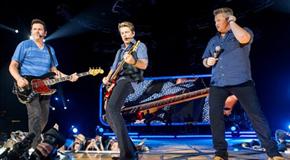Features
The Perspective From Back Of House

At least, that’s how you make Rascal Flatts tour manager Jan Eric Volz happy.
But he admits he doesn’t let much get to him.
Moderator Scott Johnson of Greensboro Coliseum led a thoughtful and frank discussion of the less glamorous, but absolutely necessary, part of touring that most people don’t see: the planning and execution of tours from the back of house and production offices, from how routing decisions are made to the cost of hard hats from Home Depot.
On hand were agencies, promoters, management, venues, a production manager, tour manager and an accountant, hitting pretty much all the angles of the process of getting an artist into town and on and off stage successfully, safely and hopefully happy – starting with the routing.
Market capacity and traffic of other artists coming through is critical – as is the crew’s experience with the venues the last time around.

“What is our capacity? Does our show fit? Does it makes sense? What can we charge, ticket-wise? What if the capacity is too low?” Live Nation’s Patrick McDill said. “You never really want to rule a place out over a bad experience. The top of any list would be to check the market, make sure it’s clean, and you’ve not been there too many times.”
Once the artist is booked, the advance team goes to work.
The process might start with a phone call at least a month out from the play date.
Getting technical specs and accurate seat maps is critical.
Having a single point of contact at the venue is preferable, Luke Bryan production manager Pete Healey said. “There are sites that are so compartmentalized you have to talk to different people for different things. They don’t know how high their steel is. They don’t know exactly the power limitations. Tech issues are huge.”
Several of the panelists agreed that a good attitude can go a long way toward making life easier for crews.
“The key thing is for the point person to be can-do person. Life on the road is a living thing. Guys like myself love it. We don’t have to punch the clock and every day is different.
“The event coordinator is important. We need this or that, and they know how to get it. Requests aren’t unreasonable. Things have to happen. It starts with production and attitude is huge. We get to the end of the day and we can’t wait to come back. We made money, you made money, everybody’s happy. I deal with security, tickets and front of house, but I can tell from the phone what that days going to be like.”
Clear communication is another issue that not only makes for happy crews, but saves money as well. While many problems are unavoidable, they shouldn’t be unsolvable – and prior planning and discussion from something as simple as the chair setup can make a financial difference in making or breaking a show.
Mike McGrath, who is Blake Shelton’s tour accountant, pointed out that the chair set up has to be right or else labor costs come into play to make changes, which affects the number of tickets that are sold, hence the bottom line.
“If we pay $250 for an Internet line, we want it to work,” McGrath said.
A tour accountant might seem like a luxury and some artists assume the tour manager is “a numbers person,” McGrath added. “On a large tour, it’s hard for one person to do a good job. I like to think I pay for myself and the artist can even make money by having me. A few years ago, I found $11,000 on an AmEx card where we were billed twice for flights, I’ve found charges for extra rooms at the ACMs.There’s lots of ways to save money.”
So what happens when a show does go sideways? Does that mean the venue can forget about hosting the artist again? Not necessarily, most panelists said.
“If there’s a problem, it has to be addressed,” Borman Entertainment’s Doug Aitken said. “As a manager, we are there to make sure it’s the best possible experience. If we sold out the building, we don’t want to throw out the baby with bathwater but issues need to be settled before we come back. If we sold the correct amount of tickets and that side was there, the instinct isn’t to not play there – let’s have a dialogue and solve it for next time.”
CAA’s Aaron Tannenbaum agreed.
“Every show day there is a different problem, but tour managers, road mangers, do solve them. I don’t usually hear about a problem unless it’s a massive one. Most will call the promoter, room manger, check in, etc., if there is a problem. The first thing is you have to identify what it is. Like Doug said, you don’t throw out the baby out with bathwater. You can certainly come back.”
For all the talk about problems at venues, Verizon Center’s Adam Sinclair might have felt on the spot, but after joking “we don’t have issues in our building,” he explained what it’s like sitting in his seat at the arena.
“Getting information a month out would be a phenomenon,” he said. “A lot of the time we’re not getting info until a couple of days in advance. Communication is key. We have stuff coming in every day. Some shows roll out at a 1 a.m. and the next rolls in at 4. We have a production coordinator assigned to every event. We want business as a partnership during the day. We never say no. Any request seems possible; it’s just a matter of getting it done. Everybody’s there to make money. At the end of the day, it all comes down to the phone and the Internet. As a building manger, we want to give everyone a great experience.”
One telling moment for the audience came during a discussion on safety.
“As minor as a hard hat may seem, it goes a long way,” Sinclair said. “When you come to the building every day, you take it for granted. We had an active shooter which was eye-opening. From a safety standpoint, we tend not to focus on a lot. It’s something to be more focused on, and that is starting, but it is critical.”
Johnson then asked the audience for a show of venues that require stagehands to wear helmets.
About half the hands in the audience went up. It was pointed out that hard hats run about $6 each at Home Depot.
Besides a safety-focused venue and staff, there are other things a road crew likes to see when it arrives at the venue.
“The first priority is great coffee,” Volz said. “We always ask where the joint is the college kids go. I enjoy seeing the GM early on because the team follows his lead. If she or he comes down and shows interest, shakes your hand, it’s great to see they care. There’s a lot of money on the table. It’s showing that you’re putting your best foot forward. It’s appreciated. It’s not mandatory.”